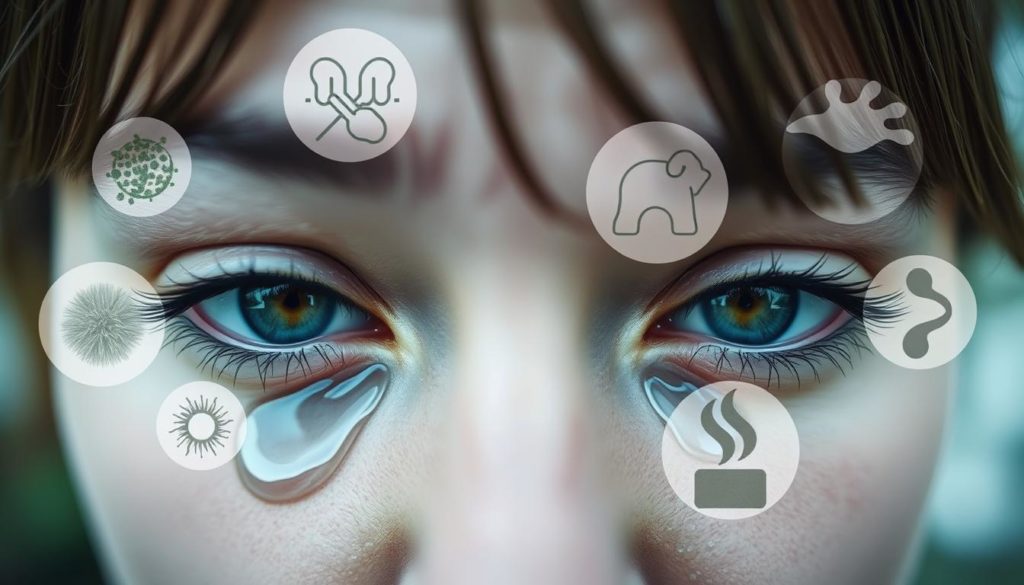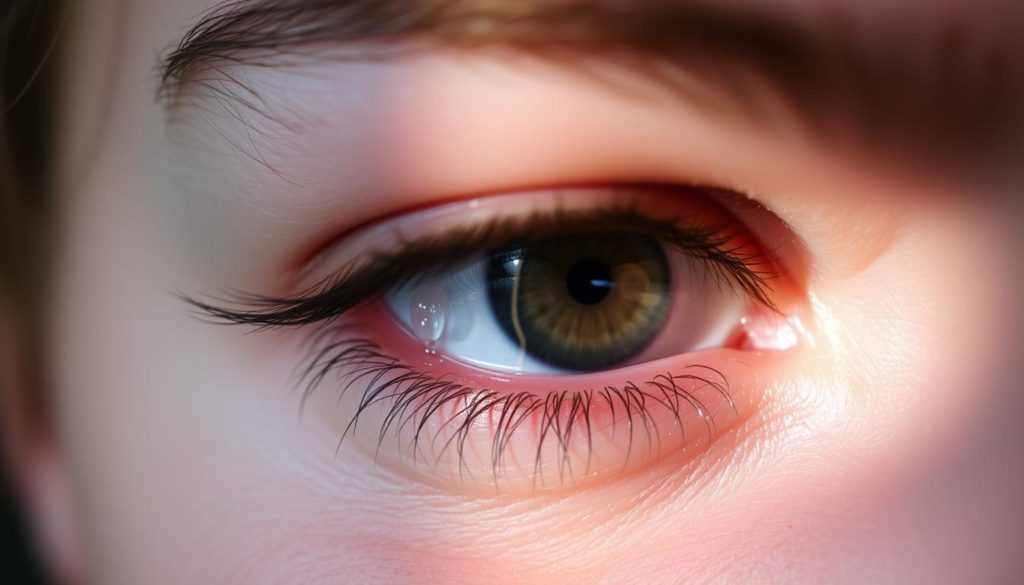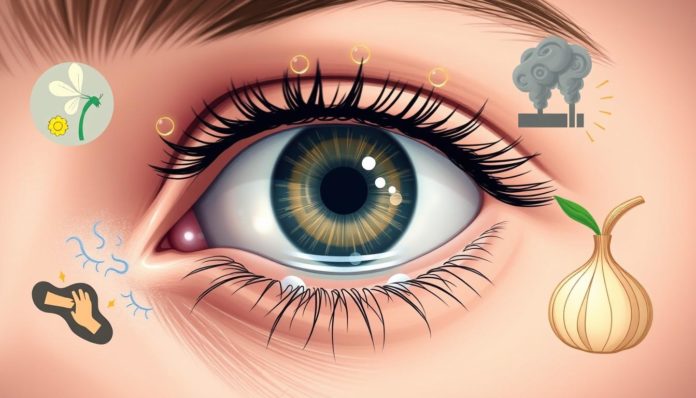Did you know over 20% of American adults have watery eyes? They often don’t know why. This problem can come from many things, like allergies or serious health issues. This guide will help you understand why your eyes might be watery and what might be causing it.
Knowing why your eyes water is key to fixing the problem. It could be something in the air or a health issue. Finding out what’s causing your watery eyes is the first step to feeling better. This section will get you ready for a deep dive into the reasons behind watery eyes.
What Are Watery Eyes?
Watery eyes, also known as epiphora, happen when too many tears spill over onto your face. This can be due to many reasons, like an imbalance in tear production and drainage. Usually, our eyes make and drain tears well, keeping them moist and working right.
But sometimes, things go wrong. This can be because of blocked tear ducts, making too many tears, or environmental irritants. It’s important to know that some causes are harmless, but others might need a doctor’s help.

Excessive tearing can also be caused by allergies, infections, or lifestyle choices. These can upset the balance of tear production and drainage. Knowing what causes it can help you fix it, keeping your eyes healthy and comfortable.
Common Causes of Watery Eyes
Understanding watery eyes is key to managing them. Many factors can cause watery eyes, from environmental irritants to medical conditions. Let’s explore the most common causes.

Environmental Irritants
Pollution, smoke, and wind can make your eyes water. When your eyes meet these irritants, they produce more tears. This helps to wash out the particles and protect your eyes.
Allergies and Hay Fever
Allergies, like hay fever, make your eyes tear up more. Pollen, dust, and pet dander are common allergens. They make your tear glands work too hard, leading to constant tearing.
Dry Eye Syndrome
Dry eye syndrome might seem odd, but it can also make your eyes water. When your eyes are too dry, they make lots of tears. This is because the tears are not good quality, so your eyes keep making more to stay moist.
Symptoms Associated with Watery Eyes
When you have watery eyes, it’s important to know the symptoms that come with them. These symptoms help doctors figure out what’s causing your watery eyes.
Redness and Swelling
Redness and swelling around your eyes are common signs. They can mean your eyes are inflamed or reacting to something. This irritation makes your eyes swell up.
Constant Tearing
Constant tearing is another symptom you might notice. It can be annoying and disrupt your day. Things like environmental irritants or health issues can make your eyes keep tearing.
Allergenic Factors for Watery Eyes
Understanding why your eyes water involves knowing about allergens. Pollen is a big problem in spring and summer. It can get into your eyes and make your immune system react. Pet dander and dust mites are also common watery eyes triggers.
When your body reacts to these allergens, it makes histamines. Histamines cause itching, redness, and lots of tears. This is your body’s way of trying to get rid of the allergens. But, the more your eyes water, the more they get irritated, leading to more discomfort.
The effects of these allergens change with the seasons. Spring and fall are tough for pollen allergies. Winter brings more indoor allergens because of less air and more heating.
| Allergen | Common Source | Seasonal Impact |
|---|---|---|
| Pollen | Trees, grasses, and weeds | Spring and Summer |
| Pet Dander | Cats, dogs, and other pets | Year-round |
| Dust Mites | Household dust, bedding, and upholstery | Winter |
To understand reasons for watery eyes, you need to know about allergens. By knowing your watery eyes triggers, you can avoid them. This helps reduce eye discomfort throughout the year.
Medical Conditions Leading to Excessive Tearing
Watery eyes from medical conditions can be really uncomfortable. They often show signs of deeper health problems. Many medical conditions lead to too many tears, causing watery eyes. Let’s look at some common ones.
Conjunctivitis
Conjunctivitis, or pink eye, is an inflammation or infection of the conjunctiva. This is the clear layer over the white part of the eye. It can be caused by bacteria, viruses, allergens, or irritants. Symptoms include watery eyes, redness, and discomfort.
Blepharitis
Blepharitis is inflammation of the eyelids. It can be due to bacterial infections, skin conditions like rosacea, or blocked oil glands. It causes watery eyes, itching, and swelling. Treating it often involves keeping the eyelids clean and, sometimes, medication.
Sinus Infections
Sinus infections, or sinusitis, make the sinuses inflamed. Symptoms include nasal congestion, pressure, and face pain. Since sinuses are near the eyes, inflammation can block tear drainage, causing watery eyes. Treating the sinus infection usually helps reduce the tearing.
It’s important to understand why watery eyes happen due to medical conditions. This helps find the right treatment and relief. Always talk to a healthcare professional to find out the cause and get the right care.
Causes of Watery Eyes
Watery eyes, or tearing eyes, can come from many sources. Some are short-term, while others are ongoing. Knowing what causes them is key to finding the right solution. Let’s look at some common reasons for watery eyes to help you understand your eye health better.
Temporary Causes: Simple things like yawning or being in strong winds can make your eyes water. These problems usually go away once the cause stops or the situation changes.
Environmental Irritants: Dust, smoke, and other particles in the air can bother your eyes. This can make them water a lot. Wearing protective eyewear can help lessen this issue.
Allergic Reactions: Allergies are a big reason for watery eyes. Things like pollen, pet dander, and some chemicals can cause allergic reactions. This makes your eyes water a lot.
Chronic Conditions: Long-term problems like conjunctivitis or blepharitis often need a doctor’s help. If your eyes keep watering, it might be a sign of a bigger health issue that needs a check-up.
Eye Strain: Looking at screens for too long can strain your eyes, making them water. Taking breaks and using good lighting can help prevent this.
It’s important to know that watery eyes can have many causes. Whether it’s something in the environment, an allergy, or a health issue, understanding the reason can help fix the problem.
Understanding Reflex Tearing Mechanism
The reflex tearing mechanism is a vital way our eyes protect themselves. It kicks in when our eyes find harmful stuff like dust, smoke, or chemicals. This *watery eyes reflex* makes our eyes tear up to get rid of the irritants.
- Neurological Pathway: It starts when nerves in the cornea and conjunctiva send signals to the brainstem. This alerts it to the presence of irritants.
- Physiological Response: The brainstem then tells the tear glands to make lots of tears. This helps wash away the irritants quickly.
Reflex tearing can also be triggered by strong emotions, spicy foods, or sudden temperature changes. These are not threats but still make our tear system respond.
But sometimes, this mechanism goes wrong. Dry eye syndrome is a common issue where the eyes can’t keep a stable tear film. This leads to constant tearing, even though it doesn’t help much.
Also, tear production depends a lot on nerve signals. Problems like nerve damage or autoimmune diseases can mess with this. This can cause persistent *watery eyes reflex*, leading to discomfort and blurry vision for many.
Here’s a detailed look at how nerves and the body work together to make tears:
| Pathway Component | Function | Common Issues |
|---|---|---|
| Corneal and Conjunctival Nerves | Detect irritants and send signals to the brainstem | Nerve damage, reduced sensitivity in these nerves |
| Brainstem | Processes nerve signals and activates tear production | Neurological disorders, autoimmune conditions |
| Lacrimal Glands | Produce tears in response to brainstem signals | Inflammation or blockages in tear ducts |
External Factors Influencing Eye Watering
Understanding the external causes of watery eyes is key to solving the problem. Many things can make your eyes water, from pollution to too much screen time. Let’s look at some major factors.
Things like smoke, dust, and chemicals can really bother your eyes, making them water more. This is common in cities with lots of pollution. Also, people who work in dusty or chemical-filled places are more likely to have watery eyes.
Long hours in front of screens can also make your eyes water. This is because your eyes get tired and start to produce more tears to protect themselves.
Don’t forget about makeup. Some ingredients in eye makeup can cause allergic reactions or irritation. This can make your eyes water too.
| Factors | Impact on Eyes |
|---|---|
| Environmental Pollutants | Irritation, Excessive Tearing |
| Workplace Conditions | Eye Strain, Allergic Reactions |
| Screen Usage | Eye Strain, Dryness, Excess Tearing |
| Cosmetic Products | Irritation, Allergic Reactions |
To fight these causes, wear protective eyewear in polluted areas or when using chemicals. Take breaks from screens and choose makeup that’s safe for your eyes. Knowing these causes helps you take steps to prevent and treat watery eyes.
When to Seek Medical Help for Watery Eyes
Watery eyes are common, but knowing when to see a doctor is key. If excessive tearing doesn’t go away with home care, it might be a sign of something serious. It’s important to know when to get help to keep your eyes healthy.
- Persistent or chronic excessive tearing
- Significant vision changes
- Severe redness or swelling accompanied by watery eyes
- Consistent eye pain or discomfort
- Frequent occurrence without clear environmental triggers
If excessive tearing happens with these signs, see an eye doctor. Also, if watery eyes cause vision problems or keep coming back, get checked out.
Get medical help fast if watery eyes come with discharge, fever, or headaches. These signs might mean an infection or something serious that needs quick treatment.
Home Remedies and Management Strategies
Managing watery eyes can be easy with simple home remedies. These methods not only help with symptoms but also improve eye health.
Use of Warm Compresses
Warm compresses are a great home remedy for watery eyes. They help unblock tear ducts and improve tear drainage. This reduces excess tearing and is very effective when done regularly.
Over-the-Counter Eye Drops
There are many over-the-counter eye drops for watery eyes. These drops fight allergens and moisturize the eyes. They help soothe irritation and manage symptoms from dry eyes or allergies.
Maintaining Eye Hygiene
Good eye hygiene is key in managing watery eyes. Cleaning your eyelids and lashes regularly prevents blockages. It also keeps out environmental irritants and allergens.
| Home Remedy | Benefits |
|---|---|
| Warm Compresses | Unblocks tear ducts, stimulates drainage |
| Over-the-Counter Eye Drops | Reduces allergens, provides lubrication |
| Eye Hygiene | Prevents blockages, cleanses irritants |
Using these home remedies and focusing on eye hygiene can greatly help manage watery eyes. It improves comfort for those dealing with this issue.
Professional Treatments for Persistent Tearing Eyes
If you’ve been dealing with persistent eye watering, it’s time to look into professional treatments. Many medical options can help relieve symptoms and find the cause. From medicines to surgery, knowing these treatments can greatly improve your life.
Prescription medicines are a common solution. They might include antihistamines, antibiotics, or drops to reduce swelling. An eye doctor can find the best treatment for you.
For serious cases, surgery is an option. Dacryocystorhinostomy (DCR) creates a new tear path. Punctal plugs also help by controlling tear flow and keeping eyes moist.
In summary, there are many ways to treat persistent eye watering. Whether it’s medicines or surgery, it’s key for eye health. Always talk to an eye care expert to find the best treatment for you.
FAQ
What are the common causes of watery eyes?
Watery eyes can be caused by many things. This includes smoke, wind, and allergies. Dry eye syndrome, eye infections, and conditions like blepharitis and sinus infections also play a role. Knowing the cause helps find the right solution.
How do allergies cause watery eyes?
Allergies, like hay fever, make your body release histamines. This leads to inflammation and more tears. Common allergens include pollen, pet dander, dust mites, and mold. Staying away from these can help ease symptoms.
Can dry eyes lead to excessive tearing?
Yes, dry eyes can make your eyes tear more. When your eyes are dry, they get irritated. This makes your lacrimal glands produce more tears. This can cause an overflow of tears.
What are the symptoms associated with watery eyes?
Symptoms of watery eyes include redness, swelling, and constant tearing. These signs can point to infections, allergies, or dry eye syndrome.
How do environmental factors influence eye watering?
Environmental factors like wind, smoke, and pollution can make your eyes water. Prolonged screen use, workplace conditions, and certain cosmetics can also cause tear overproduction.
When should I seek medical help for watery eyes?
If you have persistent and excessive tearing, eye pain, vision changes, discharge, or swelling, seek medical help. These signs may indicate a serious condition that needs professional care.
What home remedies can help manage watery eyes?
To manage watery eyes, try using warm compresses and over-the-counter eye drops. Also, keep your eyes clean to prevent infections and irritations.
What professional treatments are available for persistent watery eyes?
For persistent watery eyes, professional treatments include prescription medications and procedures to unblock tear ducts. In some cases, surgery may be needed. An eye specialist can help find the best treatment for you.


